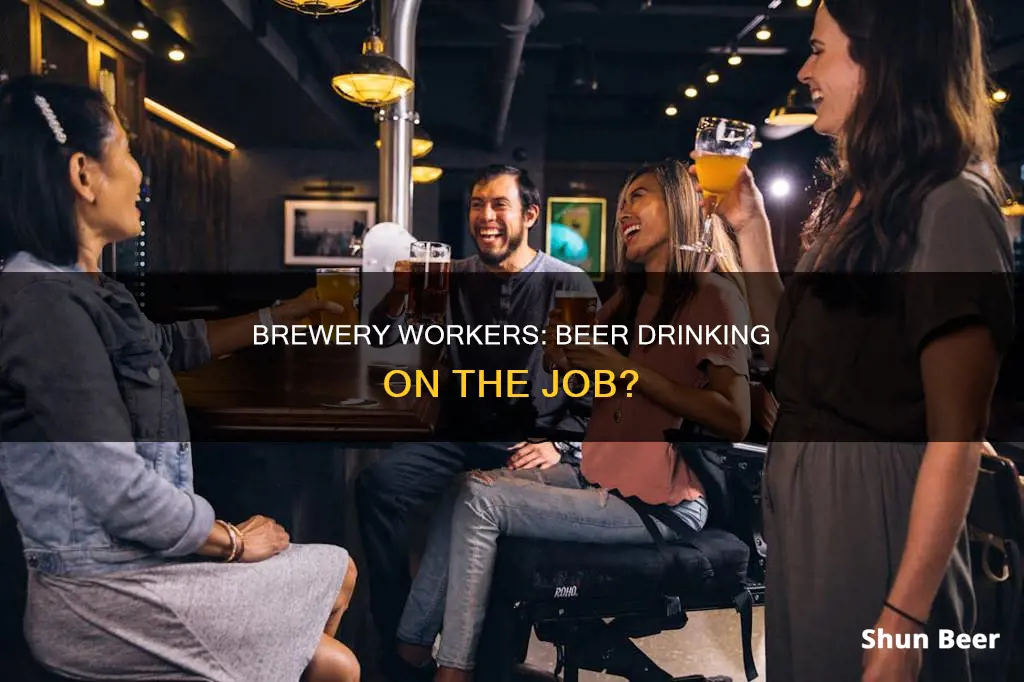
Drinking on the job has long been a contentious issue, with various industries and companies adopting different policies. While there are no laws explicitly prohibiting alcohol consumption at work, specific occupations, such as those involving driving or operating machinery, are subject to regulations like the Transport and Works Act 1992 and the Road Traffic Act 1988, which make it illegal to work under the influence. Additionally, employers have a legal Duty of Care to their employees, often resulting in zero-tolerance policies or limitations on drinking during working hours. The discussion is particularly relevant for brewery employees, who have historically been allowed to drink during work, and it remains common in small, local breweries, as well as in countries like Denmark and Australia. However, larger breweries tend to prohibit drinking while working due to safety concerns and the potential for alcohol dependence. This shift towards stricter policies is also influenced by insurance liabilities and the desire to foster a healthy work environment.
| Characteristics | Values |
|---|---|
| History of drinking beer during working hours | Drinking beer during working hours has been a common employee perk since the 18th century. However, this practice has been phased out by employers since the early 1900s. |
| Current drinking policies | Major US, German, and UK brewers prohibit drinking beer while working. Small, local breweries may allow it. In Denmark and Australia, brewery workers are allowed to drink free beer within certain limitations, such as during lunchtime only. |
| Opinions on drinking policies | Some people believe that drinking policies should be flexible and based on trust, allowing employees to drink in moderation during or after work. Others argue for strict no-drinking policies to ensure safety, productivity, and compliance with legal and insurance requirements. |
| Drinking culture | Drinking in the office has been a part of American work culture, especially in startups and agency-like firms. It is considered a perk and a way to foster connections and improve productivity. However, it can also lead to exclusion and liability issues. |
| Legal considerations | There are no specific laws regarding drinking at work in general. However, certain industries, such as those involving driving or operating machinery, have laws prohibiting alcohol consumption during work hours. Employers have a legal Duty of Care to ensure the safety and well-being of their employees. |
What You'll Learn

The history of drinking beer during work hours
Drinking beer during working hours has a long history, and its popularity has waxed and waned over the centuries.
In the Roman era, soldiers were entitled to a liter of Posca, a mix of water and sour wine, as outlined in the Corpus Juris Civillis, a lawbook. In medieval times, wine or liquor rations were common across Europe, with clergy in monasteries, soldiers, and household workers attached to noble families all receiving wine rations.
In the 1500s, Venice was the richest and most powerful city-state in Europe, and its cutting-edge shipbuilding industry provided wine rations to workers, who drank twice a day and received bonuses when a ship was completed.
In the 18th century, it became common for brewery workers in the US to drink beer during the workday, and this practice continued until the early 1900s. By the 20th century, drinking on the job was prohibited to prevent alcohol dependence and workplace accidents. However, even today, small local breweries may still allow employees to drink during work hours.
In the 1950s and 1960s, it was common for office workers in certain business sectors, such as advertising, to drink during work hours, with the "three-martini lunch" becoming a well-known phenomenon. This culture continued into the 1970s but declined afterward due to changing social norms and concerns about liability and employee health.
Today, the practice of drinking during work hours is largely taboo, with many companies having strict policies against it. However, in recent years, there has been a resurgence, particularly in startups and agency-like firms, where drinking on the job is seen as a perk and a way to foster connections and improve productivity.
Champagne and Beer: A Perfect Pair?
You may want to see also

Pros and cons of drinking beer during work hours
The practice of drinking beer during work hours has been largely phased out by employers since the early 1900s, especially among major breweries. However, small, local breweries may continue to allow it, and it remains commonplace in countries like Denmark and Australia.
Pros
- Improved employee performance and connections: Light drinking in the workplace may incentivize employee performance and help employees bond and connect. Office happy hours and drinking with colleagues can foster connections and help employees feel appreciated and committed to the company.
- Stress relief: Drinking can help employees relax and provide a mood boost, especially after a tough or stressful workday.
- Improved creativity: Alcohol can eliminate barriers to creative breakthroughs and improve employees' creative problem-solving abilities.
- Improved recruitment and retention: Having alcohol at work can be a unique perk that helps a company stand out to promising candidates and retain top talent.
Cons
- Inappropriate conduct: Alcohol can loosen inhibitions, leading to inappropriate behavior and an increased risk of harassment.
- Exclusion of certain employees: Allowing drinking at work may exclude those with addiction issues, religious prohibitions, or health issues. It could also lead to peer pressure or uncomfortable conversations about abstaining.
- Compromising sobriety: Making alcohol readily available can compromise the sobriety of recovering alcoholics.
- Liability issues: There are potential liability issues regarding insurance policies, transportation after drinking, and monitoring consumption.
- Negative health effects: Drinking can lead to negative health effects, including dehydration, increased muscle soreness, and impaired cognitive and physical performance.
- Decreased productivity: Alcohol consumption can lead to decreased productivity, absenteeism, and poor job performance.
- Safety concerns: Drinking on the job can raise safety concerns, especially in certain work environments.
Ultimately, the decision to allow drinking during work hours depends on various factors, including company culture, employee preferences, and potential risks and liabilities. It is important for employers to carefully consider the potential benefits and drawbacks before implementing any policies regarding alcohol consumption during work hours.
Businesses and Beers: Where Can You Drink?
You may want to see also

Safety concerns and insurance liabilities
Drinking on the job can lead to a number of safety concerns and insurance liabilities for breweries. Firstly, it is important to note that drinking on the job has been largely phased out by employers since the early 1900s, with major US, German, and UK brewers tending to prohibit it. This is due to the increased risk of workplace accidents and alcohol dependence.
Allowing employees to drink during working hours can compromise the safety of the workers. Breweries involve working with dangerous equipment and conditions, such as heat, pressure, acid, caustic chemicals, ladders, and slippery surfaces. Operating such equipment while intoxicated increases the risk of accidents and injuries. In addition, drinking on the job can lead to impaired judgment, decreased productivity, and difficulty in concentrating, which can further compromise safety.
From an insurance standpoint, allowing employees to drink during working hours can create liabilities for the company. If an employee gets injured or causes an accident while intoxicated, the company may be held liable. Additionally, there may be issues with insurance policies containing alcohol-related exclusions. Companies may also face challenges in monitoring consumption to ensure employees do not overindulge, and providing designated drivers or alternative transportation for employees who have been drinking.
To mitigate these safety and insurance concerns, many breweries have implemented policies prohibiting drinking during working hours. Some breweries allow limited consumption during specific times, such as lunchtime or at the end of a shift, while others restrict drinking to professional tasting or quality control purposes only. Implementing and enforcing clear and consistent policies are crucial to ensuring the safety of employees and reducing potential liabilities.
Tooth Extraction: Beer Drinking Timeline and Safety Tips
You may want to see also

Workplace policies and rules
Brewery workers have historically been allowed to drink beer during the workday. In the US, it was a common employee perk since the 18th century, but this practice has been largely phased out by employers since the early 1900s. Today, major US, German, and UK brewers tend to prohibit drinking beer while working, but small, local breweries may continue to allow it.
There are no laws specifically concerning the consumption of alcohol at work. However, certain jobs that require operating machinery or driving prohibit drinking on the job. Even if your job doesn't involve driving, many workplaces will have a zero-tolerance attitude towards drinking during working hours. Employers have a legal Duty of Care to their employees, which means they are responsible for ensuring their employees' safety and wellbeing.
Workplace policies on drinking during working hours vary. Some companies have a strict no-drinking policy, while others may allow drinking in moderation during lunch breaks, as long as it is off the premises. Some companies may even provide free alcohol to their employees as a perk, especially in the case of breweries or start-ups.
Regardless of the specific workplace policy, it is important to drink in moderation and not let it affect your work performance or safety. Drinking too much can cause you to lose focus and may even lead to accidents. It is also essential to be mindful of colleagues who do not drink for personal, health, or religious reasons, and avoid pressuring them to drink.
If you are unsure about your workplace's drinking policy, it is best to refer to your employee handbook or speak to your manager or HR department. It is also important to remember that even if your workplace has a relaxed attitude towards drinking, you should still drink responsibly and ensure your safety and that of your colleagues.
Drinking Beer and Driving in the UK: What's Allowed?
You may want to see also

Drinking culture and expectations
Brewery workers have historically been allowed to drink beer during the workday. In the US, it was a common employee perk since around the 18th century, but this practice has been largely phased out by employers since the early 1900s. Major US, German, and UK brewers all tend to prohibit drinking beer while working, but small, local breweries may continue to allow it.
In the modern age, drinking in the workplace is often considered a perk, especially in start-ups and agency-like firms. Some companies have in-office bars, while others offer virtual happy hours. While drinking at work can help employees bond and connect, it can also lead to inappropriate conduct and exclusion of those who don't drink.
When it comes to brewery employees, there are varying policies regarding drinking during working hours. Some breweries prohibit any consumption of beer during work hours, while others allow limited drinking, such as during lunch or at the end of the shift. Still, others may permit drinking during the shift as long as it's in small quantities and doesn't interfere with work performance or safety.
It's important to note that drinking on the job can be a liability for employers, especially if it leads to accidents or inhibits employee productivity and safety. As such, many workplaces have a zero-tolerance attitude towards drinking during office hours. Additionally, certain industries, such as those involving driving or operating machinery, have laws in place that prohibit drinking on the job due to safety concerns.
Ultimately, the expectations around drinking culture in breweries can vary depending on the company's policies and the local laws. While some breweries may allow limited drinking during work hours, others may have stricter policies in place to ensure the safety and well-being of their employees.
To ensure a positive drinking culture and set clear expectations, it is essential to have well-defined and communicated policies. These policies should be outlined during employee onboarding and included in employee handbooks. By establishing clear guidelines and expectations, breweries can promote a safe and responsible drinking culture among their employees.
Beer and Amnesteem: Is It Safe to Drink Alcohol?
You may want to see also
Frequently asked questions
Drinking beer during working hours has been a common employee perk since the 18th century, but this practice has been largely phased out by employers since the early 1900s. Major US, German, and UK brewers all tend to prohibit drinking beer while working, but small, local breweries may continue to allow it.
In general, there are no laws specifically concerning the consumption of alcohol at work. However, certain jobs that require driving or operating machinery are subject to the Transport and Works Act 1992 or the Road Traffic Act 1988, which make it an offence to drive while under the influence of alcohol.
Some supporters of drinking at work argue that it incentivizes employee performance, helps employees bond and connect, saves employees from tension meltdown, improves creative problem-solving abilities, and improves recruitment and retention. On the other hand, critics argue that it can lead to inappropriate conduct, exclude non-drinkers, compromise the sobriety of recovering alcoholics, and create liability issues.







